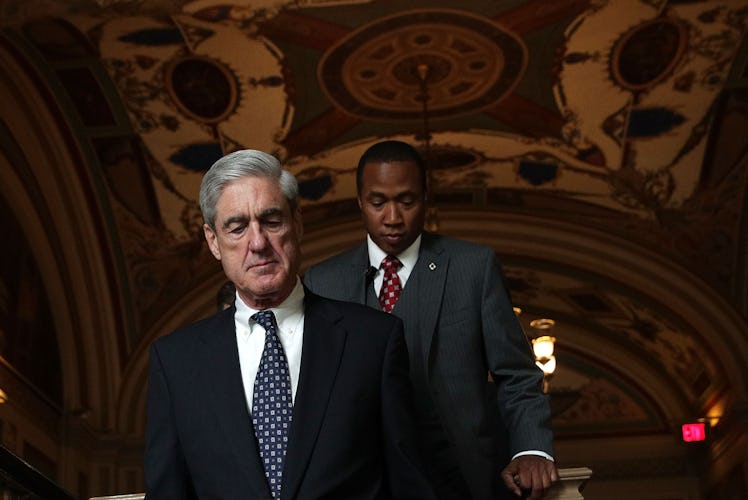
This Could Be Why Mueller Didn't Make A Call On Obstruction Of Justice
Special Counsel Robert Mueller's investigation into whether the Trump campaign colluded with Russian operatives during the 2016 presidential election has been one of the most discussed topics since... well, the election. However, as of March 22, Mueller submitted his report, and the summary of his findings took many people by surprise. On Thursday, April 18, the Justice Department (DOJ) released the report, which answered everyone's burning question: Why didn't Mueller make a decision on obstruction for justice? There may finally be an explanation (maybe).
Basically, the investigation decided "not to make a traditional prosecutorial judgment" whether to prosecute or not. Mueller noted the DOJ Office of Legal Counsel (OLC)'s opinion that a sitting president cannot be indicted, in large part because of the possibility of destabilizing the executive branch of government. On page 214 of the report, Mueller noted that, should the investigation conclude that Trump had likely committed a crime, he could not be prosecuted with a trial — and thus given no chance to clear his name. As such, the report decided not to use an approach that could "result in a judgment that the President committed crimes." The report said in part,
[W]e determined not to apply an approach that could potentially result in a judgment that the President committed crimes. … [A] prosecutor’s judgment that crimes were committed but that no charges will be brought, afford no such adversarial opportunity [as a trial] for public name-clearing before an impartial adjudicator.
However, the report also noted in the conclusion that, "[I]f we had confidence after a thorough investigation of the facts that the President clearly did not commit obstruction of justice, we would so state."
For what it's worth, Attorney General William Barr said that Mueller had told him expressly he was not saying that the OLC decision prevented him from finding a crime. At a press conference on April 18, Barr said,
We specifically asked [Mueller] about the OLC opinion and whether or not he was taking the position that he would have found a crime, but for the existence of the OLC opinion. And he made it very clear several times that that was not his position. He was not saying that but for the OLC opinion he would have found a crime. He made it very clear that he had not made the determination that there was a crime.
Mueller first submitted the report to the DOJ on March 22. Two days later, on March 24, Barr shared a summary of Mueller's report to the public, in which he wrote that the investigation had found there was not sufficient evidence to prove that the president or his campaign team had colluded with Russia during the presidential election. Barr quoted Mueller's findings in his summary,
As the report states: '[T]he investigation did not establish that members of the Trump Campaign conspired or coordinated with the Russian government in its election interference activities.'
On obstruction of justice, the report was a little more reticent, saying (as quoted by Barr) that "while this report does not conclude the at the President committed a crime, it also does not exonerate him." Since the report was released, a number of House Democrats weren't convinced that was all to see, and have pushed to read the report in full.
Just when it felt like Mueller submitting his report represented the end to this political saga, that wasn't the case. On April 3, the House Judiciary Committee voted to authorize a subpoena in order to obtain Mueller's full report. The motion was set by Judiciary Committee Chairman Jerry Nadler, who released a statement on April 3 about the report, and an allegation that Barr was unwilling to cooperate with the House. Nadler said,
The Constitution charges Congress with holding the president accountable for alleged official misconduct. That job requires us to evaluate the evidence for ourselves — not the attorney general's summary, not a substantially redacted synopsis, but the full report and the underlying evidence. But if we cannot reach an accommodation, then we will have no choice but to issue subpoenas for these materials. And if the department still refuses, then it should be up to a judge — not the president or his political appointee — to decide whether or not it is appropriate for the committee to review the complete record.
Well, it looks like that hard work has paid off. Since Mueller started working on his report, Trump has consistently referred to the investigation as a "witch hunt" and denied any collusion took place.
I don't know about all of you, but this drama surrounding the Mueller report beats even the best episodes of Scandal. If only it, too, was fiction.